The Future of Blogging: Personalization, Artificial Intelligence, and the Role of the Reader

Blogging has grown significantly over the years since I started my professional career as a writer in 2013.
As we continue to jettison into the future, the rise of technology has many content creators and marketing teams alike wondering what the real future of blogging is.
The use of artificial intelligence (AI) and machine learning (ML) mechanisms is increasing rapidly. With the recent introduction of tools such as ChatGPT, Google Bard, and Dall-E 2, many industry professionals have scratched their heads, wondering how much longer will blogging remain relevant.
I’ve got some good news for those of you who’ve made a career in content creation – the future of blogging is still as bright as ever!
In fact, 71% of B2B marketers have stated that content marketing has become more important to their organization over the last 12 months.
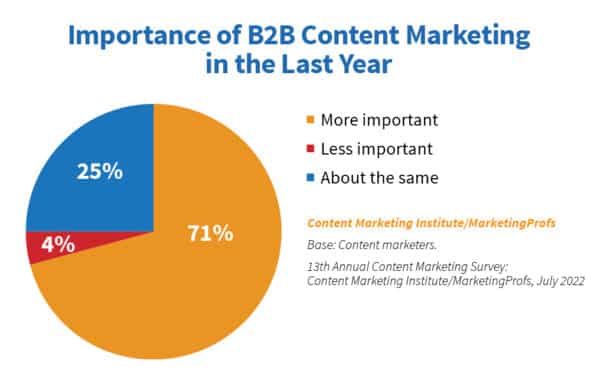
Source: Content Marketing Institute
Even better? Further research shows that roughly 86% of B2C marketers plan to use content marketing in 2023, with one of the top types of content being blogs.
We must start embracing the forthcoming changes in AI and content creation. Why? Because AI isn’t going anywhere. AI doesn’t have to be this terrifying thing that will lead to the demise of content creators and marketing as a whole.
In fact, your business can leverage tools to enhance your blogging and your content marketing efforts. How? By incorporating personalization, and the reader’s role as crucial elements to shaping the future of your content strategy.
Personalizing your content that’s driven by AI algorithms can enable you to cater to your audience’s specific interests and preferences, thus ensuring a more engaging experience with your business. Power shifts towards the reader as their feedback, preferences, and engagement patterns drive content direction and quality.
Embracing these indispensable components will elevate blogging, making it a more valuable and versatile communication tool in the digital era.
Table of Contents:
- The Role of the Reader in Blogging
- The Rise of Personalization in Blogging
- Artificial Intelligence and the Future of Blogging
- The Future of Blogging: Challenges and Opportunities
- Make the Most of Your Blogging Strategy with JS-Interactive
The Role of the Reader in Blogging
When we think about the future of blogging, we have to recognize that content creation is changing, and personalization and AI are becoming a big deal. But, what really makes a blog successful is the readers.
They are the heart of it all.
When it comes to blogging, it’s all about two-way communication. Readers play a crucial role in shaping and growing a blog, providing valuable feedback, insights, and inspiration. The key to successful blogging is acknowledging and appreciating the reader’s role.
Understanding the Role of the Reader in Blogging
While blogging, it’s easy to focus solely on your writing process and the content you’re producing at that moment. From personal experience, I know how easy it is to get so lost in my thoughts and process that I forget to consider who I’m writing for.
Readers are vital to the success of a blog because they bring the content to life by engaging with it. They are not just passive content consumers but active participants in the blogging process.
They make a blog more dynamic and interactive by:
- Providing feedback
- Sharing posts on social media
- Commenting
- Interacting live with the writer
Without readers, a blog is little more than a static webpage.
You’ve got to be in sync with your audience. This means actively interacting with them and keeping their needs, interests, and concerns in mind.
This approach ensures that you provide your readers with relevant, engaging content that helps you build that ever-important online relationship.
Creating a community of loyal readers keeps them returning and even spreading the word.
The Importance of Reader Feedback
It comes as no surprise that many brands claim to understand the importance of customer/reader feedback. Unfortunately, only some actually take the time to listen to what their readers have to say.
The numbers simply don’t lie; approximately 63% of customers believe businesses need to do a better job at listening to their feedback.
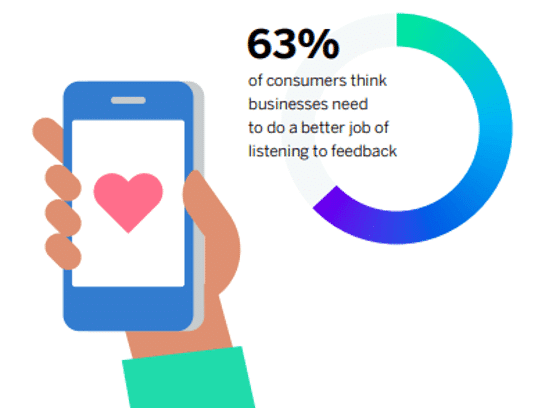
Source: Qualtrics
To increase engagement and establish credibility, practice listening to your readers and addressing their questions to build a stronger community around your blog.
To make the most of reader feedback, take note of any recurring comments or suggestions and use them to improve your content.
If you’re open to receiving feedback and taking a proactive approach, you can create a welcoming environment for your audience and enjoy long-term success as a blogger.
Examples of Reader Engagement in Blogging
There are numerous ways in which readers can engage with blogs, some of which include:
- Comments: Comment sections are a popular way for readers to provide feedback, share their thoughts, and engage with others. As a blogger, responding to comments can help you establish a rapport with your audience and encourage further engagement.
- Social media: Many bloggers use social media platforms like Twitter, Instagram, and Facebook to promote content and interact with readers. These platforms offer opportunities for readers to share your posts, tag you in their posts, and even message you directly.
- Email: Some readers may prefer to communicate with bloggers through email. This can be an effective way to build a more personal relationship with your audience and receive their feedback and suggestions directly.
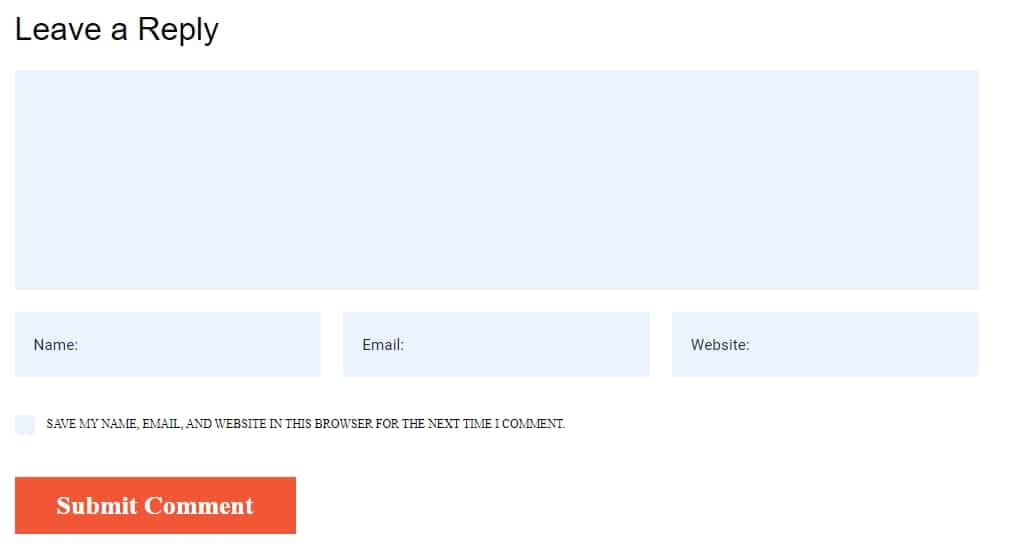
Provide opportunities for readers to engage with your blog, by creating a more vibrant and interactive community to drive traffic and build your brand.
The Rise of Personalization in Blogging
Did you know that nearly three-quarters of consumers these days only pay attention to personalized marketing messages? That’s according to a report from SmarterHQ.
Customized online content, including blogs and marketing messages, leads to higher engagement.
Blogs that tailor content to your interests keep you engaged and coming back. In fact, I read a report by HubSpot that said personalized calls-to-action (CTAs) have a 202% higher conversion rate compared to generic CTAs.
But of course, there’s a limit to how personal things can get before it starts feeling a bit weird. You want to avoid crossing that line.
So, how do you strike the right balance?
What is Personalization in Blogging?
Personalization in blogging means tailoring content to meet readers’ needs. This includes personalized:
- Content recommendations
- Email newsletters
- User experiences
- Product or service suggestions
- Reading lists
- Special offers or promotions
- Call-to-action messages
- Interactive elements
- Search results
- Landing pages
- Content feeds
- Visual elements (images, videos)
Sure, while personalized content is great, roughly four in five Americans (82%) believe there needs to be more transparency in how businesses utilize their personal information, with 86% stating they believe companies collect too much information about them.
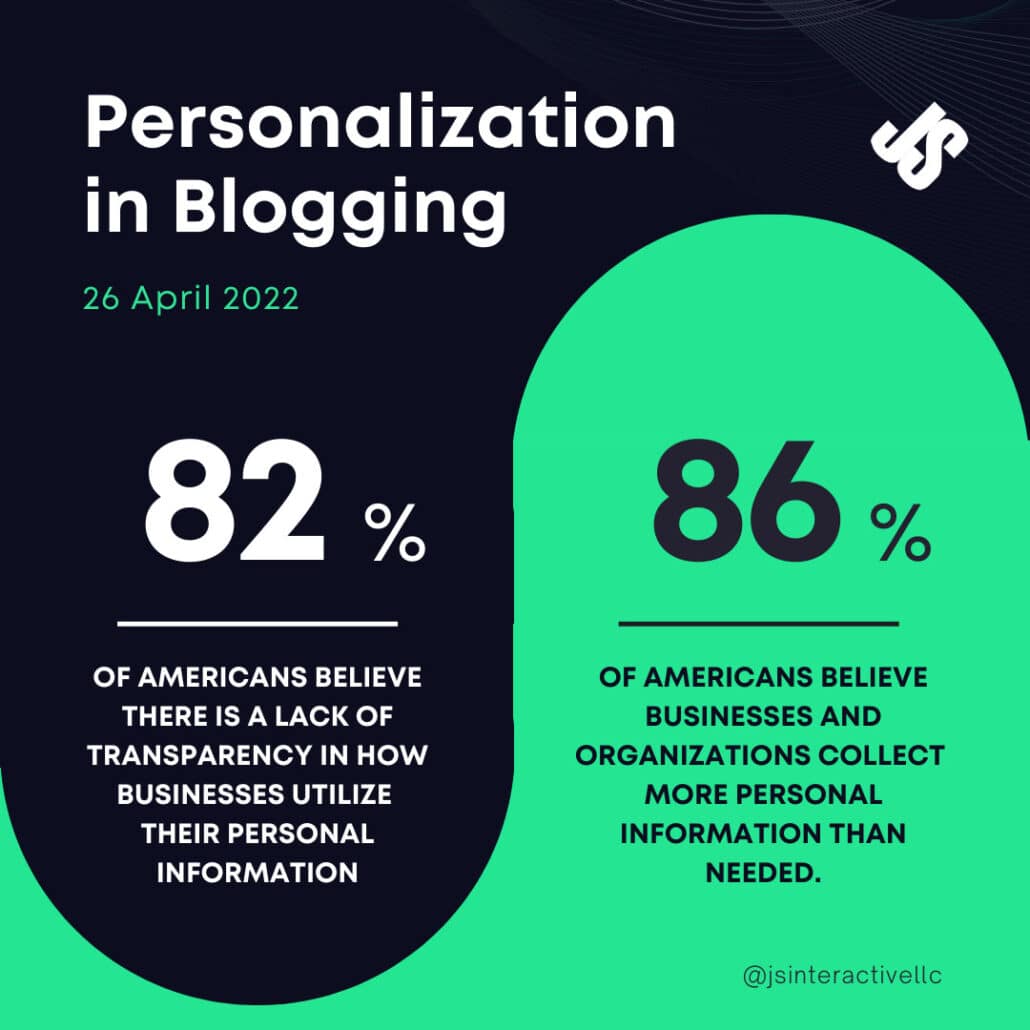
Personalization can make a difference in how your readers engage with your content when it comes to blogging. But you want to be careful about how you use their data to personalize online experiences. Don’t be creepy or invasive.
Striking a balance between personalization and respecting user privacy is key to building trust with your readers and providing a positive experience.
To personalize your blog without making your readers feel like their privacy is being invaded, try out these ideas:
- Offer clear and concise information about collecting and using consumer data and allow users to opt-in or out.
- Provide a clear value proposition for why users should share their data with you, such as personalized content recommendations or exclusive offers.
- Be transparent about the data you collect and how you use it, and avoid collecting unnecessary or sensitive information.
- Use anonymized or aggregated data whenever possible to minimize the risk of identifying individuals.
- Avoid intrusive or misleading tactics, such as hidden data collection or deceptive language.
- Prioritize user privacy and data security and invest in strong security measures to protect user data from unauthorized access or misuse.
Why Personalization is Key for the Future of Blogging
Personalization is no longer a nice-to-have feature for blogs, but a must-have to stay competitive. Here are some reasons why:
- Improved user experience: Personalization allows for a more tailored and relevant experience for the reader, increasing engagement and the likelihood of returning to the blog.
- Increased conversion rates: Blogs can increase conversion rates and drive more leads by personalizing content based on the reader’s interests and preferences.
- Higher engagement rates: Personalized content is proven to increase engagement rates compared to non-personalized content, and 76% of consumers get frustrated when content is not personalized to their interests and needs.
- Improved SEO: Personalized content can lead to higher click-through rates and longer time spent on the blog, positively impacting SEO rankings.
- Competitive advantage: Personalization can set a blog apart from its competitors and help it stand out in a crowded market.
When you develop a personalized experience for your readers, you give them a better experience and cater to their desire to be heard, understood, and treated as the individual they are.

Source: Qualtrics
Examples of Personalization in Successful Blogging
Personalization in blogging can take many forms. Below are some common examples of personalization in blogging:
- Customized homepage: Some blogs have personalized homepages that show different content to different visitors based on their interests, browsing history, and other data points. This can include recommended articles, personalized greetings, and targeted advertisements.
- Tailored content: Personalized content can take the form of recommended articles or blog posts based on a reader’s previous interactions with a blog, or it can involve different versions of the same content tailored to specific reader segments based on interests or other demographic data.
- Chatbots: Chatbots can provide personalized support to readers and help them find the content they are looking for based on their interests and preferences.
Artificial Intelligence and the Future of Blogging
Artificial Intelligence (AI) is rapidly changing how blogging works. With its ability to analyze data, predict user behavior, and personalize content, AI tools make it easier for bloggers to engage with their audience and create high-quality content.
The Impact of AI on the Future of Blogging
The future of blogging is rapidly changing due to advancements in AI technology. One significant impact of AI on blogging is its ability to analyze user data and content trends with tools such as SEMrush.
Tools such as these can provide insights into your audience, behaviors, and interests, allowing them to create high-quality content that allows you to engage with your audience and demonstrate your expertise, experience, and authority – all while helping you build trust and credibility.
With the help of AI algorithms, bloggers can even gain insights that can enhance the quality of their work while also automating content creation.
You can enhance your writing by analyzing the language you use in your blog posts through the use of AI-powered Natural Language Processing (NLP) algorithms. These algorithms help identify patterns, trends, and even sentiment, allowing you to make better decisions about structuring your content and engaging your readers.
AI Tools That Can Benefit Your Content Creation
There are many AI tools available that can benefit bloggers and improve the quality of their content. Some examples include:
- Content creation and optimization tools, such as Content at Scale or Jasper, can analyze data and suggest keywords, headlines, and even entire articles to help bloggers create high-quality content.
- Personalization tools like Salesforce can analyze user data to deliver personalized content recommendations and improve user engagement.
- Analytics tools like SEMrush and Buzzsumo can analyze user behavior and content performance to provide bloggers with insights to inform their content strategy.
Ethical Considerations for AI in Blogging
As with any technology, using AI in blogging raises critical ethical considerations. AI can significantly impact people’s lives, and if not developed and used responsibly, it can lead to unintended consequences, such as perpetuating bias, discrimination, or misinformation.
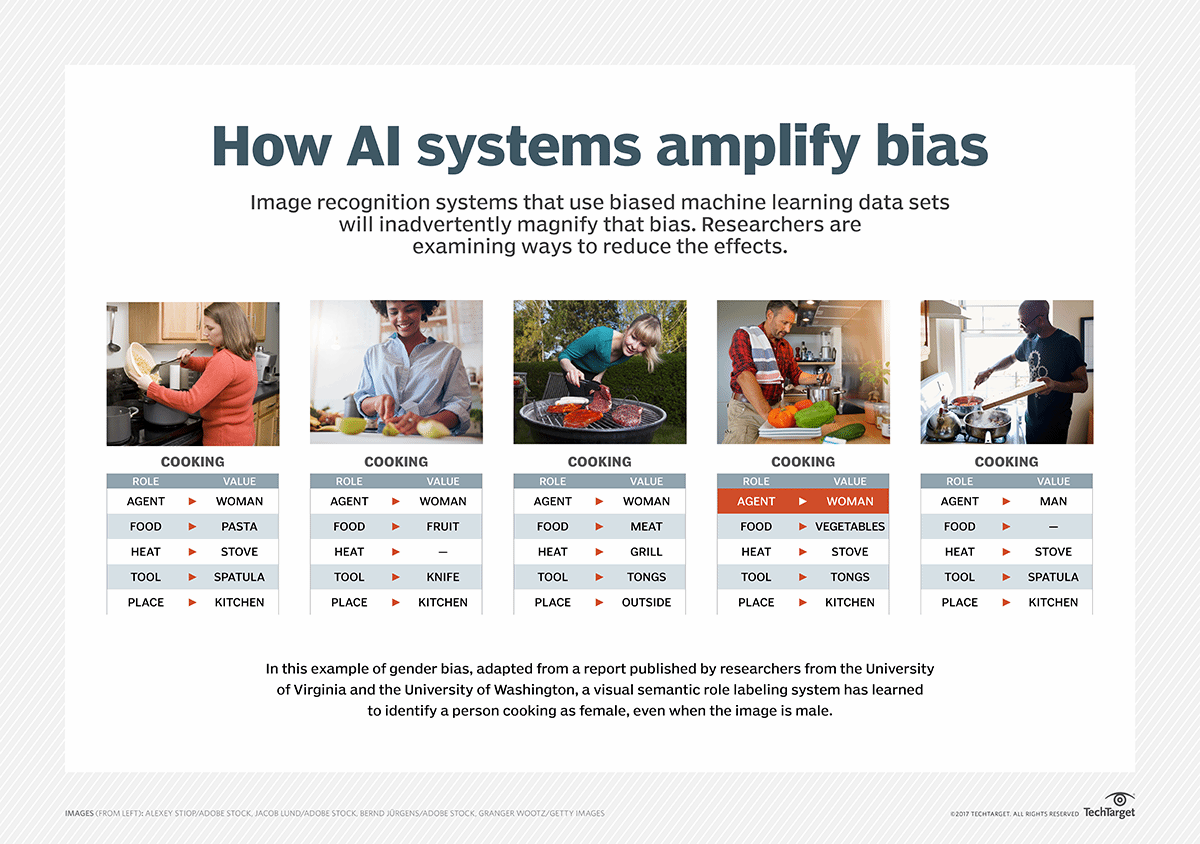
Source: TechTarget
While AI can be a valuable tool for bloggers, it’s essential to consider the ethical implications of its use, including:
- Bias and discrimination: AI algorithms can perpetuate biases if not carefully designed and monitored. For example, AI may identify “teachers” as all female, while the gender of teachers is much more diverse.
- Privacy: AI tools rely on user data to provide insights and personalization, raising concerns about privacy and security.
- Transparency: Bloggers must be transparent about using AI tools and how they use data to personalize content.
By approaching AI with these ethical considerations in mind, bloggers can continue to innovate and create valuable content for their audience.
The Future of Blogging: Challenges and Opportunities
Blogging has come a long way since its inception in the early 1990s. It is no longer just a means of sharing thoughts and ideas with others; it is now a legitimate business model for many companies. However, as the industry grows, it faces challenges and opportunities worth exploring.
The Challenges Facing the Future of Blogging
While the growth of the blogging industry presents many opportunities, it also poses several challenges that bloggers must overcome, including:
- Increased competition: As the number of blogs grows, it becomes increasingly challenging for bloggers to stand out and attract readers.
- Monetization: While blogging can be profitable, monetizing a blog can be challenging, especially for new bloggers.
- Changing technology: AI and machine learning are driving the constant evolution of technology. For bloggers, keeping up with this rapidly changing landscape can be challenging.
The Opportunities for Growth in the Future of Blogging
Despite the challenges, the future of blogging presents many opportunities for growth and success, including:
- Niche markets: With the increasing number of blogs, bloggers have more opportunities to target specific niches and establish themselves as experts in that field. And with the help of tools such as AI, they can become even more effective at targeting their niche to increase their following and readership.
- Diversification: Bloggers can expand their reach by diversifying their content offerings, such as creating podcasts, videos, or online courses.
- Collaboration: Bloggers can collaborate with other bloggers and brands to expand their reach and create more significant monetization opportunities.
Make the Most of Your Blogging Strategy with JS-Interactive
As technology and consumer expectations evolve, the future of blogging will grow, too. Although ethical considerations and the ever-changing SEO best practices will bring challenges, there will also be ample opportunities for growth and innovation.
By staying up-to-date on emerging trends and embracing new technologies, bloggers can position themselves for success in the years ahead.
Ready to take your blogging strategy to the next level? Contact us today to learn more about how we can help you achieve your goals and stay ahead of the curve in the fast-paced world of digital marketing.